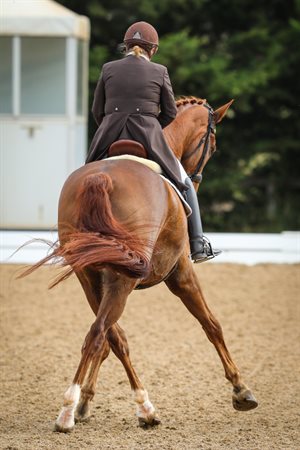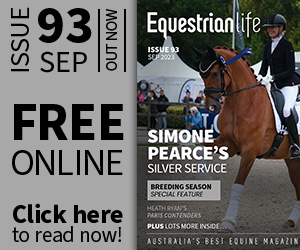|

|
This article has appeared previously with Equestrian Life. To see what's in the latest digital issue, please click here.

Kerry Mack riding Mayfield Limelight in the Grand Prix test.
© Michelle Terlato Photography
Never stop persevering
By Kerry Mack
“Perseverance, secret of all triumphs,” said Victor Hugo. “The difference between perseverance and obstinacy is that one comes from a strong will, and the other from a strong won’t," said Henry Ward Beecher. We take a look back on this article from Kerry Mack about how perseverance is critical to success...
PERSEVERANCE IS THE steady persistence in a course of action, a purpose, in spite of difficulties, obstacles, or discouragement. Perseverance requires persistence, tenacity, determination, purposefulness, resolve. It is one of the qualities of all successful riders in any discipline. In fact, I think successful riders tend to be people who are attracted to riding partly because it is difficult. Successful riders enjoy the challenge. We often say to each other: “Well, if it was easy I would have given it up long ago,’’ when we are bemoaning how hard it is.
When I say “successful” riders, I don't just mean elite level riders. Riders at all levels persist in the face of difficulty. We have all had the disappointment of horses that go lame at crucial moments, defeat being snatched from the hands of victory by trivial things we can’t control, like a paper cup blowing across in front of us, or a sudden downpour of rain and wind, or the rubbish truck emptying a bin at that crucial moment, or cramp in a test. All these things have happened to me at a national championship. I even had a horse that so didn't want to start in my first Australian Showjumping Championship Grand Prix that he decided to come out the door of the float while it was moving. He knocked himself unconscious and I was sure he was dying. We all lived to tell the tale, and I was really relieved that he turned out to be okay, but I was so disappointed at the time after all the training and anticipation. Then there was the time a stone bruise put an end to a three-day event preparation at the last minute, the time a stone bruise happened a couple of hours before the trot-up, the time my eventer tied up on the roads and tracks, the time my Grand Prix horse tied up in the test at the nationals. The only time Pzazz has ever got his tongue over the bit was in the canter half-pass zigzag at the Nationals! We all have tales of woe. And yet, if you are reading this you are one of the people who persist.

Persistence is necessary to reach your end goal.
© FEI / Arnd Bronkhorst / Pool Pic
Now some of the difficulties are the circumstances of life around our riding. The need to earn a living, the need to juggle riding with other commitments of work and family. Some people are contending with illness. Persisting at riding does come at the cost of other things in life. I think it is worthwhile sometimes to step back and review the cost to your wider life to check that it is a cost you are prepared to pay. For example, are you spending enough time really being available to your children or family? Do you want to achieve financial security and own your own home? Can you achieve these important long-term goals with the commitment you are making to your horse-riding? It is good from time to time to consider if you are living according to your values. Take time to see the wood for the trees. The age-old test is to consider whether you will look back at the end of your life with regrets.
Let’s assume that you have overcome the big obstacles of life and that you are living according to your values and look at the what, how, and when of persistence, and let’s start at a kind of micro level, within our daily training. Determination is one of the prerequisites for persistence. You, a human being, are a fine example of the most highly sophisticated creature on Earth, possibly in the universe. You must be more determined than your horse. When you want to go through the water, or load him on the float, you must be more determined than him. If you are not determined to succeed then it may be best not to ask him, or else you may teach him that he can do what he likes. Determination and persistence don't necessarily mean just keeping on asking or telling him in a way that he keeps saying no. You may need to persist but use your far superior intelligence to work out different ways to ask him so that he does answer “yes”. Let’s take the example of getting him to go through a large water puddle. This is a common problem not only for eventers. There may be a puddle or stream out trail riding, or even in the middle of a dressage arena. Maybe you need to tune up the response to the leg before you present to the water. Keep him facing the obstacle. Maybe you can get him to follow another horse in. Maybe you can get him to get his feet wet by going in backwards so he gets wet before he realises, and works out then that it’s not so bad. Maybe you keep his feet moving in the way of the in-hand work we discussed last time. Maybe you just patiently keep the pressure gently on with a tap, tap, tap, until he goes a tiny bit forwards, so then you can take the pressure off. You must keep some pressure on until he says “yes” and then it comes off. Remember it is release of pressure that trains.
Sometimes, persisting means being smart enough to work out what is the smallest step possible in the direction you want to go. You are asking for travers and he says no, it’s too hard to bend with his concave side going towards the direction he is travelling. Ask an easier question: a leg yield with a straight horse with his head toward the wall. He just has to go forwards and sideways off your leg in an uncomplicated way, the wall helps him to understand not to go forwards. He can figure out what to do with his legs before putting it all together. Ask with small steps first, or even at walk. Just keep making the question easier until the answer he gives is yes, and then progress one step at a time towards your original goal. Be happy with progress in the right direction. Be prepared to take a few more days, or even weeks or months, if it is necessary to reach the end goal.
When should you not persist? You should definitely not persist when it is getting dangerous. Safety must always be the most important thing. The safety of yourself and the safety of your horse override any other consideration. If you start something and find that you underestimated the resistance your horse would put up, you may need to stop. If you are loading on the float and find he is unmanageable, just stop, get better prepared by getting a longer rope, gloves, or perhaps move the float to a better location, backed into a small, safe yard where he can’t get away. Don't persist in a big open paddock or where there is barbed wire. Take the time to prepare, and when you have stacked the cards in your favour, and then you can persist.
Don't persist if you are frightened, as it probably won’t end well. If you have asked him to go into the water and he resists violently by rearing high or doing something else that you may not be able to manage, you may be better off changing the subject. Ask him to do something simpler and succeed. Perhaps you need the help of someone more experienced, or perhaps you need to make sure that the basic responses are more established before you try again.
Don’t persist if you are losing your cool. A little bit of anger helps make you strong, more determined, but there is no place for rage when handling horses. Best to walk away, calm down and try again later. If you feel he is getting stressed it can be best to stop and let him breathe out and calm down and ask a small question. Persist but at an appropriate pace.

Know when not to persist, and only push yourself if you are prepared.
© Franz Venhaus
Don’t persist if your horse is getting too tired. This is especially true for young horses as they tire easily. You want to train your horse to want to please you. Short successful sessions work best when training. Stop before he is tired. An exhausted youngster may decide to give up or lie down. He will then learn that actually you can’t make him do things. If you think he is getting tired, ask for something easy and finish on a good note. Be aware of the weather. In hot weather do less. Some years ago a famous European trainer came to Australia in summer to train our elite dressage riders and totally underestimated the effect of heat on horses with disastrous consequences.
Training a horse requires persistence over a long time. Sometimes in the course of training we find that actually our horse is not suitable for the goal we have set. Perhaps he is talented but rather unwilling. I no longer believe that old adage that all the really talented ones are difficult. It is just not true. In these days of purpose-bred horses most of the really good ones are not difficult. A willing horse is likely to go further. For me I know I will enjoy working together with a willing horse. I will not enjoy feeling that I have to make an unwilling horse cooperate. Sometimes to persevere with your long-term goal you need to change horses. Don't keep making excuses for a horse that really isn't performing. Find someone who wants to do the job he is better suited for. Or if he is proving to be so unwilling or unpredictable that he is dangerous, retire him. Don't be responsible for someone else’s injury by selling a dangerous horse.
Persistence is a prerequisite for successful training. But be smart. Remember the old definition of insanity, to keep doing the same thing but expect a different outcome…
READ THE LATEST NEWS ARTICLES HERE

|

|

